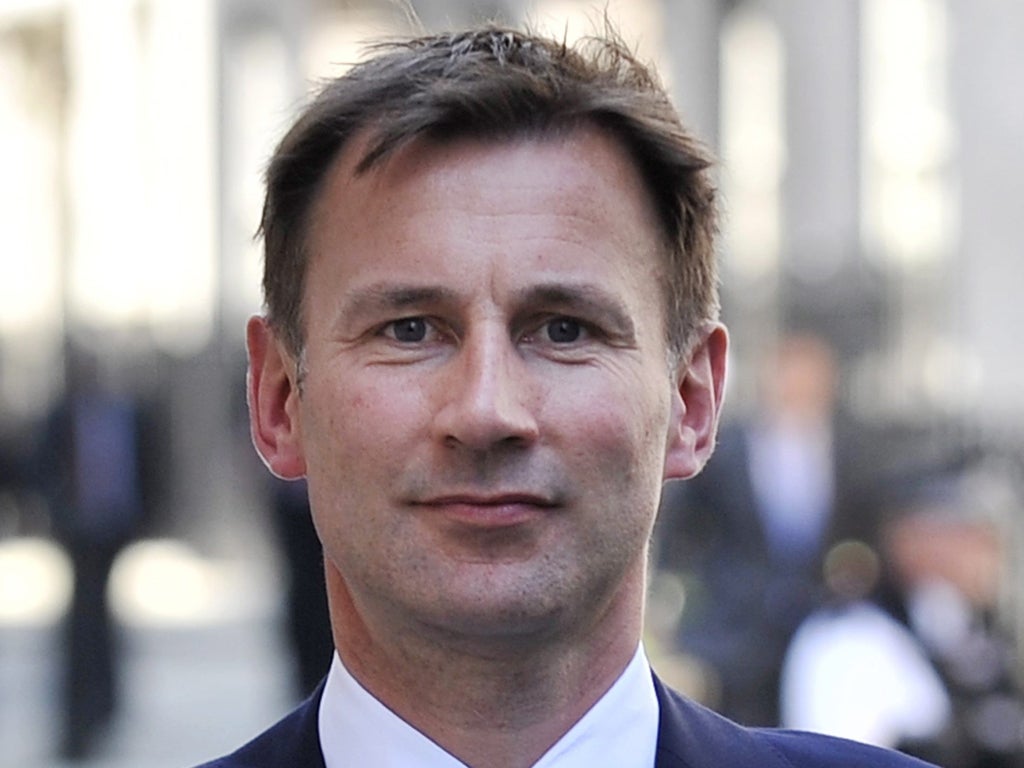Lawyers told Hunt to stay out of Sky deal
Culture Secretary was warned to 'do nothing' to influence Murdoch's bid for broadcaster

The Government was battling to defend itself last night against new evidence detailing its close relationship with Rupert Murdoch's News Corp at the time of the £8bn bid for BSkyB.
Documents released at the Leveson Inquiry reveal that:
* Jeremy Hunt may have flouted legal advice not to intervene to support the BSkyB bid by writing to the Prime Minister, stressing the importance of the deal going through.
* The Culture Secretary exchanged more than 50 text messages with the News Corp lobbyist Fréd Michel in the run-up to being given responsibility for the bid, referring to Mr Michel affectionately as "papa".
* David Cameron's most senior aides were taking part in back-channel communications with News Corp's chief lobbyist during the Milly Dowler scandal and while the Prime Minister was publicly condemning the company.
* Mr Hunt's special adviser gave News Corp advance notice about the Government's deal with the BBC over the licence fee in an email marked "in confidence". The Chancellor George Osborne's chief aide also reassured the company on the likely contents of his Budget days in advance.
But the revelation that Jeremy Hunt may have flouted legal advice from his own department is sure to feature in questioning as the Culture Secretary is called before the inquiry next week. A senior lawyer in the Department for Culture, Media and Sport (DCMS) advised Mr Hunt against intervening in the decision in November 2010 – but on the same day the Culture Secretary wrote to David Cameron stressing the importance of the deal going through.
Patrick Kilgarriff, the DCMS legal director, wrote it was "unwise" for the Culture Secretary to make representations over the bid because at that stage his Liberal Democrat cabinet colleague, Vince Cable, was charged with making an apolitical, "quasi-judicial" decision on whether to allow the takeover.
The Culture Secretary was apparently keen to ensure that Mr Cable made a decision in favour of Mr Murdoch's company. But any intervention by Mr Hunt risked opponents of News Corp's deal making a legal challenge to whatever Mr Cable decided because "it will appear to be purely political in nature", Mr Kilgarriff warned.
Mr Hunt was himself handed the responsibility of deciding the bid in December 2010 after it emerged that Mr Cable had been recorded privately "declaring war" on Rupert Murdoch.
Mr Hunt later supported the bid despite controversy over the power it would hand to Mr Murdoch's company.
Mr Kilgarriff sent his memo at 5.49pm on 19 November 2010. Because the timing of Mr Hunt's memo has not yet been disclosed, it is not clear whether the legal advice was received before or after Mr Hunt wrote to Mr Cameron that day expressing his concern at the impact on business of Mr Cable's intentions and passing on James Murdoch's anger that the bid was being delayed.
In another twist surrounding Mr Hunt's controversial memo, Jonathan Stephens, the DCMS Permanent Secretary, told the Leveson Inquiry that he had not seen Mr Hunt's intervention before it was sent to Downing Street.
Around that time, legal advice was sought about whether Mr Hunt was allowed to intervene in the decision being taken by Mr Cable. To Mr Hunt's apparent disappointment, the advice was a resounding: "No".
In the memo dated 19 November 2010, Mr Kilgarriff wrote: "Whilst there is nothing legally which formally precludes the Secretary of State CMS [Culture, Media and Sport] from making representations to the Secretary of State BIS [Business] to inform the latter's decision as to whether to refer the public interest considerations in this merger to the Competition Commission, it would be unwise to do so."
In a memo on 7 December 2010, Mr Kilgarriff insisted on sticking to his previous advice, writing: "I appreciate that the advice is not what JS [Jonathan Stephens] and possibly JH [Jeremy Hunt] wanted to hear – but I think it amounts to 'Do nothing, do not try to convey your thinking to VC [Vince Cable], he must act quasi-judicially and only through formal processes.'"
After Mr Cable was stripped of the decision and it was handed to Mr Hunt, fresh warnings were given about the need for Mr Hunt to maintain his "quasi-judicial" outlook on the bid. After Mr Hunt's previous support for Mr Murdoch, in June 2010, was spotted, the legal director noted this before he was handed the decision. The lawyer warned: "If so it is not helpful and tends towards an element of pre-judging the issue."
Subscribe to Independent Premium to bookmark this article
Want to bookmark your favourite articles and stories to read or reference later? Start your Independent Premium subscription today.

Join our commenting forum
Join thought-provoking conversations, follow other Independent readers and see their replies